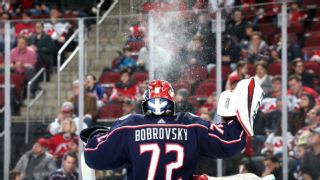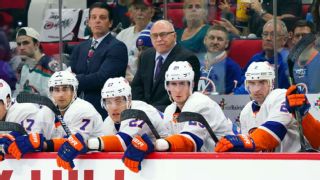|
Welcome to a weekly feature where we try to have some fun with underlying numbers. The plan is to highlight a few trends, then dig beneath the surface to get a better sense of what they ultimately mean, what's causing them, and how likely it is that they'll continue moving forward. Think of them as bite-sized deep dives. This week, we're taking a closer look at the team blessed with the most lethal offensive attack in the game, a goalie that's got a lot on the line this season, and a team that continues to exceed expectations.
Tampa Bay's power surgeUndoubtedly one of the biggest storylines in NHL circles this season has been the spike in scoring. Thanks to some combination of smaller goalie equipment, tighter officiating that makes it more difficult to slow down the top players, and teams generally getting smarter about how they construct their lineups, we're seeing offensive numbers reminiscent of a bygone era. The league average save percentage is south of .910 (.908 to be exact) for the first time since the 2008-09 season. The league average for goals scored per game is north of 3.00 for the first time since coming back from the lockout in 2005. Most of the scoring back then was artificially inflated by sky-high power-play totals, as the league tried to completely rewrite its rule book by cracking down on anything and everything. This season feels different. The scoring now comes across as far more organic, trickling down as a natural result of hockey that's being played at its absolute pinnacle. No team better encapsulates where the league is right now than the Tampa Bay Lightning, who are currently in the process of lapping the field all across the board. Having rattled off 11 wins in the past 12 games, they're now sitting atop the entire league with 58 points and a whopping plus-48 goal differential through 37 games. Most importantly, they're keeping some breathing room between themselves and Toronto in the Atlantic Division, which will help them avoid a nightmarish first-round playoff matchup against either the Leafs or the Bruins. Any way you slice it, the Lightning have been truly unstoppable this season. At five on five, they're in the top three in shot share, goal differential, actual goals generated and expected goals scored. On the power play, only the Winnipeg Jets create goals more efficiently on a per-minute basis, and no team has scored more total goals overall. When scanning their lineup for holes to be potentially targeted by opponents, there doesn't appear to be anything abundantly glaring that can be exploited. Because of Brayden Point's emergence as a bona fide star, Jon Cooper and his staff now have the ability to mix and match by rotating two especially lethal scoring lines. By stripping opponents of the luxury of being able to gear up the entire defensive game plan toward slowing down just the one group, the Lightning essentially force other teams into the perilous position of having to pick their poison. The top-six gets the lion's share of accolades and offensive production, but what vaults the Lightning to the next level is actually their bottom-six group. Thanks to a sparkling draft record over the years, Tampa Bay is able to supplement their top players and round out the lineup with a medley of young, effective, cost-controlled pieces. Whether it's Mathieu Joseph, Anthony Cirelli or Yanni Gourde, the Lightning are stacked with versatile wingers that could comfortably play significantly bigger roles on nearly any other team in the league. But because of how deep the Lightning are up front, they're tasked with the role of feasting on the remaining scraps that are left over for them when the top lines are finally done eating. Despite not getting to stack up large point totals as a result, they're still immensely valuable to the overall operation; every time they're on the ice they're wreaking havoc, drawing penalties and keeping the opposition busy while the top lines get a breather. For the time being, there's no real drop-off throughout the lineup regardless of who's out there, and if there happens to be an injury down the road, there are a number of viable internal options to step up and contribute. Because of all those chess pieces at his disposal, Cooper has experimented with various combinations throughout the season, and the only ones that have dipped below the 50-percent mark in terms of shot share and expected goals have been the ones involving Ryan Callahan. Barring a series of poorly timed injuries, there's no reason why he should be playing to begin with when the games matter most, which conveniently gets rid of the most obvious weak link of the bunch. Put all of it into one complete package, and you've got a team that's trending toward offensive totals that we haven't seen in 30-something years: In fact, the last time a team had a higher goals-per-game average than what the Lightning have done thus far was all the way back in 1995-96, when a Pittsburgh Penguins team that boasted Mario Lemieux and Jaromir Jagr at the peak of their powers (not to mention Ron Francis, Petr Nedved, and Sergei Zubov) scored a ridiculous 4.41 times per game. Yet as impressive as they've been early on, the Lightning ultimately have much larger long-term goals than just securing the regular-season scoring title. With the Washington Capitals having finally exorcised their playoff demons last year, arguably no team's current core carries more playoff baggage than Steven Stamkos & Co. do at the moment. The good news is that this year's version looks like it potentially has another gear to hit. Given just how close they've come in the past, being loaded with that extra bit of offensive talent could very well be the difference between once again falling short in excruciating fashion and finally getting over the hump to win it all.
Bobrovsky, you're back on the case! After an incredibly shaky start to the season, Sergei Bobrovsky appears to once again be the annual contender for the Vezina Trophy that we've come to expect over the years. He's coming off a stupendously dominant week that earned him the NHL's first star honors, bumping his save percentage for the season up to .913. It's still at a point that's well below his typical standard, but considering the combination of his personal .882 mark in October and the league average that has dipped down to .908, the fact that he's already back up to where he is comes as a testament to just how good he's been of late. It's also worth noting that his overall numbers are being dragged down by two separate eight-goal-against stinkers, where it was curious as to why he wasn't pulled. If you remove those two from the equation, his season total shoots up to .928, which is likely a better representation of his actual talent level. The Blue Jackets have needed every bit of it: With Joonas Korpisalo continuing to struggle to get over the .900 Mendoza Line in net, and intriguing prospect Elvis Merzilkins still a year away, they're as reliant as ever on Bobrovsky's brilliance on a nightly basis. For our purposes here, what's far more interesting than the performance of Bobrovsky and the Blue Jackets is where the two parties go from here, with Bob a pending unrestricted free agent. Assuming they decide to play the string out and see what happens come the summer, it'll provide us with a relatively unprecedented scenario. Going back through the archives of the free-agent contracts that have been dished out over the past handful of years, there hasn't really been a situation in recent memory where a goalie that was anywhere remotely near Bobrovsky's caliber became available for bidding on the open market during the prime of their career. Here's the full list of multiyear contracts over the past five offseasons that have been handed out to goalies that had yet to play a game for their new team. There's typically one of two types of contracts that comprise the list: A veteran goalie that's brought in to be part of a time-share, representing relatively low acquisition risk but also similarly limited upside A goalie that's flashed potential early in his career, with the team trading for his rights and signing him to a long-term deal banking on him having room to grow
For the teams throwing big money at established goalies on the open market, the track record isn't exactly inspiring. Ben Bishop, who is the closest facsimile to Bobrovsky among the bunch purely by process of elimination, has been perfectly fine in Dallas. But it's not as if his addition has suddenly given the Stars the face-lift they anticipated, and his contract looms large as an onerous one in the years to come. Most of the others were either a wash that didn't really lead to anything glorious, or were downright disappointments from the jump. Part of that has to do with the goaltending position itself, which has proven to be rather volatile and unpredictable. With so much uncertainty involved, teams have wisely moved away from the idea of investing significant long-term resources because of the very real risk of becoming attached to an anchor that it presents. At the same time, you don't really appreciate the importance of a reliable goaltender until you don't have one. Considering Bobrovsky's Vezina-level track record, there's presumably a number of teams currently craving that No. 1 puck stopper that would throw caution to the wind and line up for his services if given the chance. Assuming he finishes the season strong, he should still be able to cash in handsomely this summer. On a team level, the Blue Jackets are clearly walking a rather delicate tight rope here. While the shrewd play would be to cash in and recoup an enticing combination of future assets for Bobrovsky (and Artemi Panarin) at the trade deadline, doing so would represent a rather cruel blow to a loyal fan base that's been passionately supporting the franchise through the dark years. This is the best group of talent they've ever had in Columbus, and moving away from it without a single playoff series victory to show for it would be an agonizing outcome. Suffice it to say, there's a lot on the line in the coming months for everyone involved.
The Barry Trotz system With John Tavares set to go up against his former team this weekend for the first time, let's take stock of where things stand all these months later. He's personally loving life with the Toronto Maple Leafs right now, playing alongside Mitch Marner. In a situation where he's surrounded by more talent than ever before, it should come as no surprise that he's currently on pace to shatter his previous personal bests for both goals and total points. The New York Islanders team he left behind may be more interesting, because following his departure there was objectively no good reason to believe they would be hovering around a playoff spot like they are right now. After losing their superstar center and attempting to replace him with what can fairly be summarized as a bunch of overpriced filler this summer, there was a justifiable expectation that the team would crater into an even deeper hole. Instead, they've been shockingly competent thus far. They're just a couple points out of a wild-card spot with some games in hand as the NHL returns from the Christmas break, and are sporting a positive goal differential. Whether they're ultimately able to keep this up and make a push toward that playoff berth is an entirely different question, but the fact that it's even a discussion right now is something worth exploring further. From a pure talent perspective, there's no way they should be ahead of teams like the Panthers, Hurricanes and Flyers in the standings. Considering that the personnel from one season to the next isn't dramatically improved, the only thing that really has discernibly changed has been the coaching. In typical Barry Trotz fashion, his arrival behind the bench has seen the Islanders shore things up defensively following last season's abhorrently porous performance in their own end. Their goals-against per game has dipped all the way from 3.57 (31st) to 2.71 (3rd), which ultimately raises the million dollar question: How much of that defensive improvement is because of better goaltending, and how much of that is because of Trotz's heralded structure and system? While the answer is likely somewhere in the middle because the two typically go hand in hand, it's worth considering that Trotz's teams have been exceeding the goal share we'd expect them to have based on their shot profile for years now, and by a rather sizable margin: There's clearly something deeper going on with what Barry Trotz teams choose to concede defensively, and how that combination of quality and quantity strategically surrendered influence the results. After being hung out to dry on a nightly basis last season by a team that clearly had no game plan in its own zone, both Thomas Greiss and Jaroslav Halak (in his new home with the Bruins) have since seen their numbers wildly improve in a short period of time. Meanwhile, the combination of Greiss and Robin Lehner has been good for fifth in five-on-five save percentage and second overall this season, behind just the heroics of John Gibson in Anaheim. It's certainly been a big departure from last season, when the Islanders were 25th and 29th in those two areas, respectively. The improvement of the other underlying defensive shot metrics hasn't been quite as extreme, but they've still gone from league-worst to at least respectably middle-of-the-pack across the board. At five-on-five, they've gone from 30th in shots against and 31st in high-danger attempts conceded to 10th and 17th in those two categories. The penalty kill has similarly gone from absolutely dreadful (73.2 percent, 31st in the league) to a much-improved mediocre (78.1, 21st). Part of that change has obviously come at the price of their own offensive totals, but there's something admirable about the way they've been able to come to terms with their current reality and act accordingly. Given the roster composition, if they continued to play the type of back-and-forth track-meet style they did last season, they'd get blown out of the water. This Islanders team won't win too many high-scoring shootouts, so it needs to slow things down and grind games out purely as a survival tactic. Talent eventually wins out in the NHL, and there's only so much that even Barry Trotz and his system will be able to squeeze out of this roster. But for now, the strings he's been expertly pulling have them looking like a tough out on a nightly basis, which is a complete 180 from their defensive debacle last season. There's long been debate in hockey circles about how much impact a coach and his system can realistically have on a team's results. If the Islanders are any indication, the answer is: a resounding amount.
|


